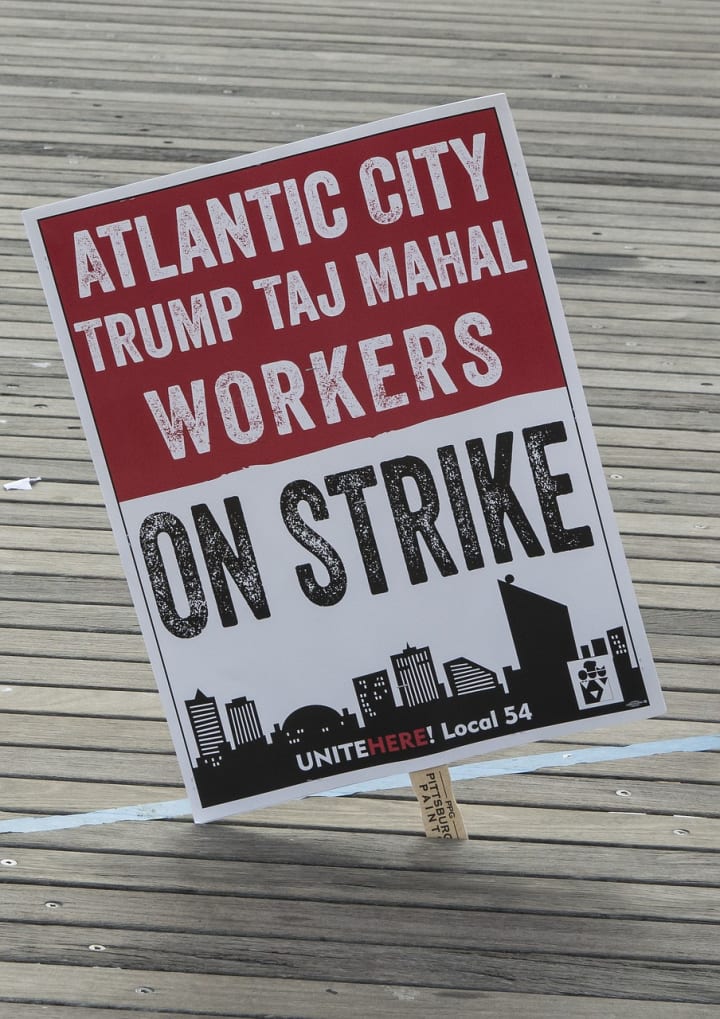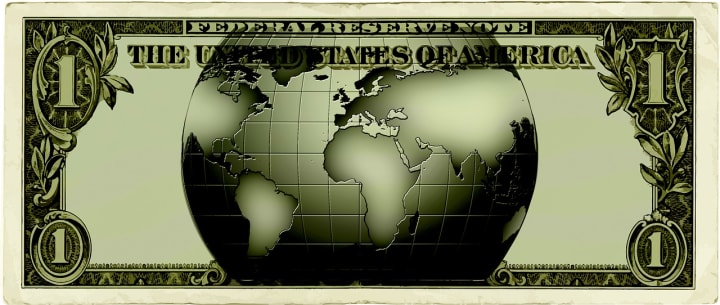Why Are You Ranking: Best Reasons to Appreciate Big Business Listed From Lowly Laborer to Top Executive
Big business gets a bad rap. Without such companies, though, the world would be in bad shape (to say the least).

People complain about the working conditions of employers like Walmart and Amazon. As if the work that they fulfill is drudgery where they are trudging through puddles of mud or carrying heavy sacks on their back over football field lengths. Complainers about the working areas of these corporations lament the fact that they have to clock in on Monday, get over the hump on Wednesday, and celebrate Friday as a means of degrading their labor but elevating the result of that work, their direct deposit. They’ll say that the staff are like Draconian rulers “coercing” them into performing task after task. But what is the truth? Are employees strapped to machines and whipped into producing more? Are they throttled and unable to break free of a signed contract that they made with a given corporation? The problem that persists is that most folks don’t realize that multi-billion dollar companies and small businesses alike have one firm rule in the United States: free will. A worker has every right to quit, retire, resign, or just walk away from a position. The same is true for people who like working at hugely successful companies and have the right to enjoy their labor, continue to work at a position, and advance up the ranks of a given industry. And every company has the right to downsize and “let go” workers to satisfy the bottom line. Those workers may grumble, complain, or far worse commit acts of violence or take their own lives. These are vicious cases and only in extreme situations do these acts occur. For the most part, people love and find enjoyment in going to work. Those who do not relish work find themselves in self-pity and in a position to bring down the spirits of those around them. But that is different with others. Their productiveness is evident with every action that they take during the course of their day (or night). While some will scoff at the fact that the people behind massive corporations reap gargantuan fiscal benefits, they drop the idea that the individuals at these companies have earned their money and should not be ridiculed for their virtues. So get your price guns and balance sheets for Why Are You Ranking: Best Reasons to Appreciate Big Business Listed From Lowly Laborer to Top Executive.
A Manager's Pose

This manager is all business.
7. Managers will ensure that the worker is satisfied.
In some cases, the employee is right. And so is the employer. At large corporations, managerial staff consider the needs, wants, and desires of their subordinates. If there is a conflict in how many packages of hot dogs ought to be processed in a given amount of time, employees are enabled to seek their superiors and request that some changes ought to be made. The workers are not forced to man cash registers or fill out reports. Employers allow laborers to either stay in the position or relinquish their role. In a world where people bemoan the high profits and billion-dollar fortunes of the CEO’s that run such enterprises, little is spoken about how much power the worker has in relation to the company. Capitalists forge the companies and permit workers the power to earn a wage with benefits. The realization that from the pyramid of ability, the executives are at the top (for the most part) because they put their minds to use the most. If it were an inverted pyramid, the whole structure would collapse as the truck driver would never have the know-how to match the plans, outlines, and strategies of a seasoned “suit.”
Rank: Lowly laborer
The wages that one generates remains with the generator, first.

A hand full of hundreds isn't so bad.
6. The only “living wage” that exists is the one a worker makes.
For a teen, single parent with bills up to their chin, it would require a great amount of money to try to pay down those statements. So, what does that single parent do? They go to work. And they find a position that will be able to sate the money that is due. He or she enters the employment market and finds that the only situation that fits their needs is just a few bucks above the national, government imposed minimum wage. Here lies the rub. Because of vicious laws that knock out the rungs from underneath the ladder, young people are excluded from even entering the workforce. They’re stranded between having no work or looking towards (what else?) the government to steal money from working people and give those funds to them. Their choice is the rational one and they take the lowest level position within the company. In a free market society, that teen mom or dad could be able to start at the bottom rung and take out trash and sweep up around a restaurant for $2 an hour; then, they may advance to the fries and make $6 per hour; with a few more months of experience, they will become cashiers and turn an $8 an hour profit; Down the line, given their potential for excellent performance, they’ll become supervisor, manager, and franchise owner, and executive and make hundreds of dollars an hour. A “living wage” is an anti-concept. It means nothing really. Whatever wage you produce is what you “live on” in a free economy. Every individual has the capacity to create their own “living wage.”
Rank: Climbing the ladder
The best baristas can produce cups like this.

The coffee's hot, come on in here.
5. Corporate executives deliver to the worker the best working space.
It is up to the executives to devise and design effective, safe, and clean working spaces for their employees. All of the nightmare stories that may have been leveled against giants like Amazon are attributed to the workers’ own inability to keep up with production. Notice how there are still a vast majority of “happy workers” at the multinational company. For the amount of money that they earn, they complete their work in ideal surroundings. The best part of working for a place like Starbucks is the fact that the CEO and other executives ensure that the lowest barista exists in an environment that promotes productivity and even fun. With the camaraderie among fellow employees who share the same values and all put forth effort to churn out a profit not for the company firstly, but for themselves, employees are emboldened to continue to produce more and more.
Rank: Making connections
Does the President of the United States remember this?

The workers are often expected to strike. Executives? Not so much.
4. The option is always there to strike.
Workers have every right to go on strike. Now, how many executives have said, “you know, we’ve been battered by not our enemies but our purported supporters. We have better standing with our competition than with our own employees. Let’s go on strike!” In full, this has only been seen in fiction like Ayn Rand’s Atlas Shrugged. In the real world, CEO’s, CFO’s, CIO’s, COO’s, and some of the other chiefs of industry take all of the derision and animosity on the chin and turn the other cheek, sadly. When is it ever the case where such people just stood up and said, “we’re not going to take this anymore”? The morality is what prevents them from doing this action. An ethics of altruism has allowed the brightest executives to just absorb all the insults and barbs hurled their way. But workers... they have carte blanche to just up and organize strikes. With them holding homemade or store-produced signs clamoring for “higher minimum wages,” no one bats an eye at such activity. Instead, news agencies cover strikes of workers with aplomb. Their words are blared like yelps from a dying house cat or bleats from a wounded goat. Some executives grit their teeth and until they’re chipped. Others seek to appease their workers and throw alms their way at the expense of their own company. This is not the American way. The truth is that strikers ought to only participate in such demonstrations if there were actual cases of rampant harassment, misconduct, or squalid conditions. Otherwise, the captains of industry should drop their reins and let the workers fulfill their roles. They should allow the forklift driver in the warehouse to conduct meetings with executives with other companies. They ought to put the lead burger maker (if there are any left) to meet with the board of directors to see just how demanding and challenging the work that executives go through on a daily basis.
Rank: Supervisory role
The Handshake That Seals the Deal of a Promotion

A sturdy ladder allows one to climb.
3. The best employees are rewarded for their efforts.
Promotions, benefits, awards, and raises among other ways to congratulate employees for their productiveness stand as viable ways for workers to advance in their careers. Businesses who value profits also value their workers, clients, and customers. For their endeavors, workers earn their way up the corporate ladder. Employees of proper government roles (police, military, law courts) find that they can get ahead in their respective roles as well. But none like American corporations. These entities crown productive achievement with more money and benefits than any bureaucrat could ever imagine. The profit motive provides for the reason why there is such a thing as Employee of the Quarter, Above and Beyond Awards and other prizes that companies shower on their employees to sway them to stay with the company and challenge with their competition. Such laurels incentivize and encourage workers to not only “keep up the good job” but to strive to excel and to graduate into ever expanding responsibilities. When a worker performs their tasks well, the company recognizes that and positions the worker in newer more demanding roles, with extra cash and benefits to boot. Once that worker demonstrates that they can be proficient at that next level, the possibilities become endless. A healthy competition within the company to have employees vie for a specific spot within the corporate structure remains a productive act. This friendly rivalry allows for higher productivity and therefore greater profits, both spiritual and material, for all involved.
Rank: Store Manager
For the most part, here's the recipe.

Success is the outcome of smart work.
2. The bigger the business, the greater the outcome for everyone.
Mom-and-pop stores are revered for their traditionalism and down home appeal. Sometimes when a “big box” store like Walmart comes to town to take over for the mom-and-pop stores, sentiments are usually mixed at best and spiteful at the worst. People see that the old ways are being carted off by the new and that breeds resentment. Large corporations are viewed as “rapacious” money grubbers who only want to seize power from hard working, independent individuals. But that is an economic fallacy. When places like Walmart come into a city, they open up the possibility for employees to receive considerable wages and benefits and provide a service to customers at a cheaper price. Without having to sacrifice, Walmart keeps prices low and quality above board. When Amazon chooses to open up another facility, they draw in hundreds if not thousands of people who are in search of a career with the major electronic commerce behemoth. Though there will be complaints about wages and conditions (see above) people still tend to need the money to pay their bills so the best option is to work for a place like Amazon. As multi-billion-dollar companies find space among the places of America and the world, everyone benefits because the number of positions exist, the goods that are traded remain within the buying range of clients, and the addition of a big business location usually beautifies the surrounding area.
Rank: Franchisee
America first in foreign policy, not trade.

The world should be open for business.
1. Big business encourages global trade.
When it comes to globalism, no other entity does it better than big business. If you live in the United States, as you buy a pair of exclusive sneakers from China, it’s not the country with which you deal. You are engaging in a trade between yourself and an individual who happens to be Chinese. Big business alleviates the trouble of trade barriers and allows for the free trade of goods throughout the globe. The key is to have tariffs, or taxes on the import of goods, be set at zero. With big business, the idea is to create as many channels of trade between and among nations that every individual will be given the opportunity to enjoy olives from Italy and sports cars from Germany. Additionally, with taxes slashed to zero, more small businesses would have the wherewithal to grow their profit margins and become bigger businesses. All involved profit from the ability to transmit these goods into the hands of those who request them while the other party gets paid.
Rank: Top executive
About the Creator
Skyler Saunders
Cash App: $SkylerSaunders1
PayPal: paypal.me/SkylerSaunders
Join Skyler’s 100 Club by contributing $100 a month to the page. Thank you!






Comments
There are no comments for this story
Be the first to respond and start the conversation.